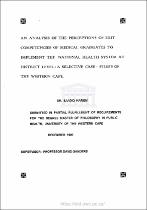| dc.description.abstract | In 1978, the Declaration of Alma - Ata was signed with 134 countries as signatories. The Declaration included a specific clause on the training of health personnel: "Primary health care relies, at the local and referral levels, on health workers...suitably trained - socially and technically
- to work as a health team and to respond to the expressed health needs o f the community. In examining the international and local literature, it is apparent that medical educators have for a long time recognised some of the shortcomings in the training of medical doctors. In 1988 the world's leading medical educators met in Edinburgh to examine, on a global scale, issues in medical curricula. The outcome of these deliberations was the Edinburgh Declaration of 1988, which in its preamble states. "Thousands suffer and die every day from diseases which are preventable, curable or self - affected, and millions have no ready access to health care of any kind. These defects have been
identified for a long time, but efforts to introduce greater social awareness into medical schools have not been notably successful. Many improvements can be achieved by actions within the medical school itself, for example to . Complement instruction about the management of patients with increased emphasis on promotion of health and prevention of disease " ( Edinburgh Declaration, 1988, pp 8). Furthermore, the Declaration proposed 12 reforms in medical education of which competency - based learning is an integral component. The area of human resource development in South Africa is at a critical stage. In October 1995 the National Minister of Education, Minister Sibusiso Bengu, appointed a Committee for Development Work on the National Qualifications Framework ( NQF ) The NQF is defined as a
framework for providing lifelong learning opportrnities utilising nationally recognised levels. The main brief of the committee was to formulate proposals which will serve as guidelines on developing a curriculum framework which will underpin the NQF ( Report of the Ministerial Committee for Development Work on the NQF, Februry 1996 ). The NQF essentially involves outcomes - based education and training, where curriculum developers work backwards from agreed desired outcomes and clearly state what the learner should be able to demonstrate an understanding for and show an ability to apply appropriately. Competence, as defined by the NQF, involves the integration of a number of specific outcomes. | en_US |

